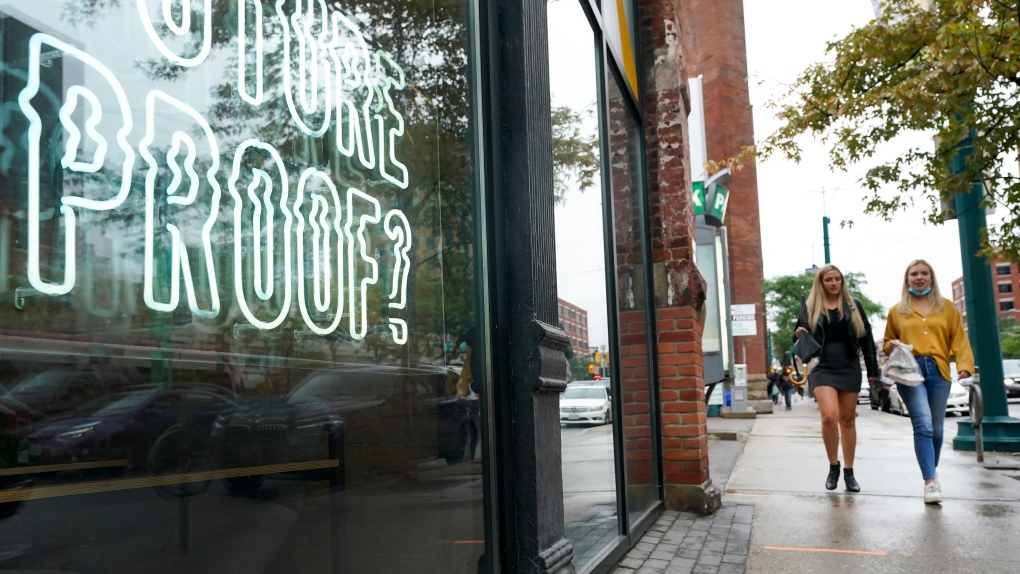Toronto launches new webpage to disclose COVID-19 exposures in large settings
 People walk past retail storefronts during the COVID-19 pandemic in Toronto on Wednesday, September 22, 2021. Ontario now requires proof of vaccination to enter many business across the province. THE CANADIAN PRESS/Nathan Denette
People walk past retail storefronts during the COVID-19 pandemic in Toronto on Wednesday, September 22, 2021. Ontario now requires proof of vaccination to enter many business across the province. THE CANADIAN PRESS/Nathan Denette
The City of Toronto has launched a new webpage that will disclose COVID-19 exposures in large settings where contact information may not be available.
The webpage, which launched Thursday, will notify community members when one or more COVID-19 cases have been detected in a setting within a defined timeframe. The settings will be in public areas where 20 or more people were present. The addresses of private residences will not be posted.
"This is especially important as we continue moving forward returning to many of the activities that we’ve missed," Toronto's Medical Officer of Health Dr. Eileen de Villa said in a statement.
"We’re sharing this information to help prevent opportunities for virus spread and equipping residents with instructions they can follow to protect their health and the health of those around them if they may have been exposed to this virus."
Information will be updated on the webpage at 3 p.m. on Mondays, Wednesdays and Fridays.
Ontario's top doctor has said that public health measures are not changing at this time amid the discovery of the new Omicron variant in the province.
As it stands, private indoor events are limited to 25 people while outdoor gatherings can have 100 people.
Capacity limits have also been completely lifted in most large venues such as movie theatres and event or sporting spaces that require proof of vaccination. Further capacity restrictions were supposed to be implemented in mid-November, but that step of the province's reopening plan was paused amid an uptick in COVID-19 cases.
According to provincial data, there were 118 new COVID-19 cases identified in Toronto on Thursday. There were also 75 new cases in Peel Region, 53 new cases in York Region, 42 new cases in Halton Region and 21 new cases in Durham Region.
CTVNews.ca Top Stories

DEVELOPING Person on fire outside Trump's hush money trial rushed away on a stretcher
A person who was on fire in a park outside the New York courthouse where Donald Trump’s hush money trial is taking place has been rushed away on a stretcher.
Mandisa, Grammy award-winning 'American Idol' alum, dead at 47
Soulful gospel artist Mandisa, a Grammy-winning singer who got her start as a contestant on 'American Idol' in 2006, has died, according to a statement on her verified social media. She was 47.
She set out to find a husband in a year. Then she matched with a guy on a dating app on the other side of the world
Scottish comedian Samantha Hannah was working on a comedy show about finding a husband when Toby Hunter came into her life. What happened next surprised them both.
'It could be catastrophic': Woman says natural supplement contained hidden painkiller drug
A Manitoba woman thought she found a miracle natural supplement, but said a hidden ingredient wreaked havoc on her health.
Young people 'tortured' if stolen vehicle operations fail, Montreal police tell MPs
One day after a Montreal police officer fired gunshots at a suspect in a stolen vehicle, senior officers were telling parliamentarians that organized crime groups are recruiting people as young as 15 in the city to steal cars so that they can be shipped overseas.
Vicious attack on a dog ends with charges for northern Ont. suspect
Police in Sault Ste. Marie charged a 22-year-old man with animal cruelty following an attack on a dog Thursday morning.
The Body Shop Canada explores sale as demand outpaces inventory: court filing
The Body Shop Canada is exploring a sale as it struggles to get its hands on enough inventory to keep up with "robust" sales after announcing it would file for creditor protection and close 33 stores.
Tropical fish stolen from Beachburg, Ont. restaurant found and returned
Ontario Provincial Police have landed a suspect following a fishy theft in Beachburg, Ont.
U.S. FAA launches investigation into unauthorized personnel in cockpit of Colorado Rockies flight to Toronto
The U.S.’s Federal Aviation Administration is investigating a video that appears to show unauthorized personnel in the cockpit of a charted Colorado Rockies flight to Toronto.

































